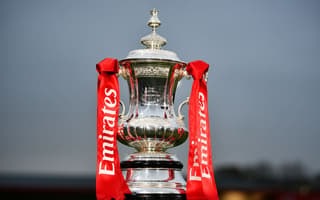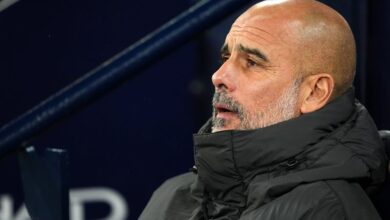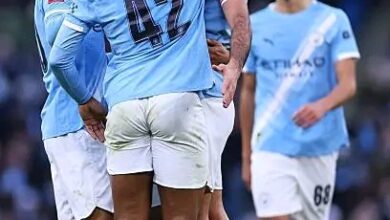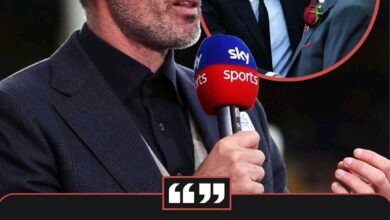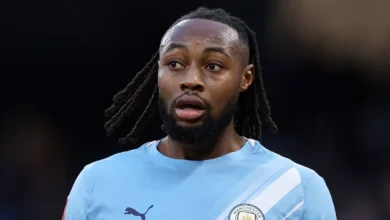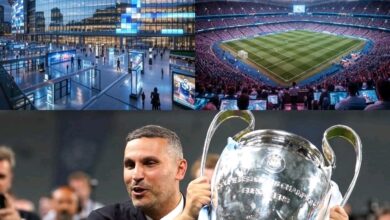Worse than Salah: Slot must drop 4/10 Liverpool ace who lost 50% duels
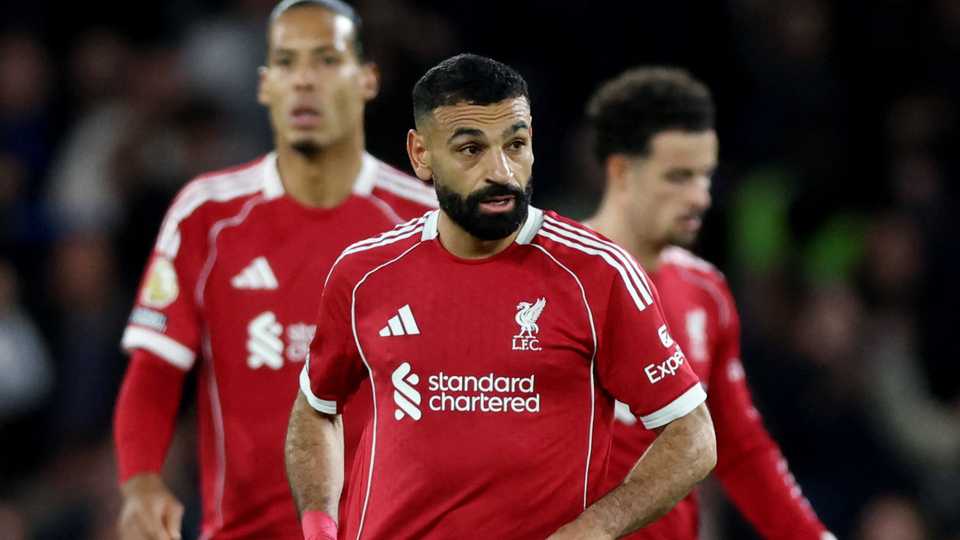
Liverpool’s nightmare continued on Saturday evening at Stamford Bridge. The reigning Premier League champions, a team that once dominated England with attacking flair and unshakable confidence, now seemed lost, fragile, and unsure. Arne Slot’s side fell to a 2-1 defeat at the hands of Chelsea, and the headlines afterward were filled with frustration, concern, and questions about what was happening at Anfield. The Reds had now lost three games in a row, a streak that would have been almost unimaginable just a few months ago, yet here it was, reality staring the fans in the face.
The match began poorly for Liverpool. Within minutes, Chelsea’s Moises Caicedo unleashed a strike from outside the penalty box, a thunderbolt that left goalkeeper Giorgi Mamardashvili helpless. It was a goal born from both brilliance and negligence. Liverpool’s defensive line, which should have closed him down immediately, did not, allowing the midfielder all the time he needed to pick his spot and fire. Fans watching from all over the world groaned in unison, hearts sinking as the scoreboard flicked to 1-0 in favor of the Blues. The uphill battle had begun, and it would be a long one.
Liverpool tried to regroup. The first half saw moments of promise, flashes of skill, and brief bursts of hope, but nothing that could truly threaten Chelsea’s dominance. It was clear that the team was struggling to find cohesion, and Arne Slot’s frustration was evident on the touchline. Every miscontrolled pass, every hesitation, and every defensive lapse added to the mounting tension. The Reds were fighting against the clock, against Chelsea’s energy, and, it seemed, against themselves.
Then came the second half, and with it, a brief moment of redemption. Alexander Isak, the Swedish forward who had been quiet for much of the match, displayed a touch of brilliance. On the turn, he cushioned the ball perfectly into the path of Cody Gakpo, and the Dutchman did the rest, firing the ball home from yards out. It was either a stroke of luck or exquisite teamwork — perhaps both — but it brought Liverpool back into the match, and for a moment, the fans dared to dream of a comeback. The score was level, the spirits lifted, and hope flickered again in the hearts of the supporters.
But hope, as it often does, was fleeting. Chelsea’s bench would write the final chapter of the match. In the 75th minute, a teenager named Estevao came off the bench, and by the 97th minute, he had delivered the killer blow. With the game deep into stoppage time, the youngster fired home, giving Chelsea all three points and leaving Liverpool empty-handed once more. The stadium erupted, but for the Reds and their fans, it was a bitter, bitter ending. The team had battled, had moments of quality, but in the end, they fell short.
And yet, the focus quickly turned to individual performances. Among the players, Mohamed Salah stood out, but not for the right reasons. The Egyptian forward, who has often been Liverpool’s shining light, looked far from his best. His return to Stamford Bridge, his former home, was meant to be a moment of inspiration, a chance to shine against old teammates and prove his class. Instead, it became a night to forget. Salah struggled to influence the game. He was rarely involved on the right, and his trademark cuts inside to unleash that lethal left foot were nonexistent.
Statman Dave, the football statistician who has followed Salah’s career closely, was quick to critique. He described Salah’s performance as “another dire showing,” highlighting a worrying string of games without a goal. According to his stats, Salah had fewer touches than any outfield player who featured for the full 90 minutes. Every attempt to dribble was thwarted; he failed all three of his dribbles and lost all five duels he contested. Paul Gorst, Liverpool Echo’s correspondent, added his voice to the chorus, giving Salah a 4/10 rating for the night and describing the winger as “off it at the moment,” a trend that was “becoming a concern” for the team.
Yet even as Salah struggled, there was another Liverpool player who arguably had an even worse night. Milos Kerkez, the summer signing from Bournemouth, looked a shadow of the player who had impressed on the South Coast. Saturday’s performance against Chelsea was emblematic of his difficulties adjusting to life at Anfield. The Hungarian full-back was replaced in the 55th minute by the experienced Andy Robertson, a move that reflected both concern and necessity. Kerkez had just 32 touches, completed only three passes into the final third, and despite winning 50% of his ground duels and tackles, his overall impact was minimal.
Gorst, who had watched the match closely, was blunt in his assessment. He also gave Kerkez a 4/10 for his efforts, describing it as a “tough afternoon” for the new Reds full-back. Liverpool fans, meanwhile, began to ask questions. Could Kerkez recover his best form? Would Slot consider bringing Robertson into the starting lineup after the international break? These were the discussions dominating social media, forums, and living rooms across Liverpool and beyond.
Kerkez is a talented player, no doubt. He has the ability to shine, to make overlapping runs, to deliver precise crosses, and to defend robustly. But form is fragile, and adaptation to a club like Liverpool, with its high expectations and intense scrutiny, can be daunting. A few mistakes on a big night like Stamford Bridge can feel magnified, and the pressure to perform can weigh heavily on young players trying to find their footing in a new environment.
Slot’s decisions in games like this are never easy. The manager must balance the team’s immediate needs with long-term development, individual talent with collective strategy, and risk with opportunity. Bringing Robertson in for Kerkez was a statement. It was a signal that performance matters above all else, that Liverpool cannot afford hesitation or underwhelming displays, and that even promising new signings must rise to the occasion or make way for experience.
The broader context of Liverpool’s struggles is also important. The team has now lost three games in all competitions, a streak that exposes systemic issues, from defensive lapses to midfield disconnections. Injuries, tactical shifts, and the pressures of a demanding schedule all contribute, but the root cause seems to be a loss of cohesion and rhythm. Attacking flair exists — players like Isak and Gakpo show glimpses of brilliance — but when defensive errors and individual underperformance creep in, the team struggles to translate talent into results.
Fans and analysts alike are quick to highlight these issues. Salah’s dip in form is noticeable, but Kerkez’s struggles are perhaps more concerning because they affect the team’s balance. Full-backs in Liverpool’s system have dual responsibilities: defending with discipline and supporting attacks with energy. When a player like Kerkez is tentative, it creates gaps for opponents to exploit and forces other teammates into uncomfortable positions. Slot must address this urgently if the Reds are to compete at the highest level.
The upcoming international break offers a brief window for reflection, analysis, and adjustment. Slot will have time to review performances, work on tactical cohesion, and consider changes to the lineup. Bringing Robertson back into the fold seems increasingly likely. The Scottish full-back brings experience, composure, and leadership that can stabilize the backline while younger players regain confidence. Kerkez, meanwhile, may benefit from time on the sidelines to adjust, train, and build resilience away from the relentless scrutiny of matchday action.
Liverpool’s challenges are not isolated to defensive issues. The attacking line, despite its potential, is inconsistent. Salah’s struggles highlight that even world-class players can have difficult patches, and the team must adapt to maintain performance. The chemistry between forwards, midfielders, and full-backs must be rebuilt, ensuring that when possession is won, transitions into attack are smooth and effective. Every missed pass, every hesitation, and every misjudged movement contributes to the team’s ongoing struggle to find rhythm and confidence.
The Chelsea match also revealed deeper tactical concerns. Early goals against Liverpool have become a pattern, exposing vulnerability in transitions and set-pieces. The midfield must learn to press effectively, the defence must coordinate closely, and communication across the team must be flawless. Even a single lapse, such as allowing Caicedo the time and space to shoot, can have disproportionate consequences, as the Stamford Bridge game demonstrated.
Slot’s challenge is immense. Managing a squad with high expectations, talented but sometimes inconsistent performers, and a fanbase hungry for success requires a careful blend of strategy, leadership, and emotional intelligence. Decisions like substituting Kerkez are emblematic of the fine margins in top-level football: one moment can shift the narrative, one choice can alter the team’s trajectory, and one performance can define a player’s confidence.
For Kerkez, the road ahead is clear but difficult. He must rediscover his best form, adapt fully to Liverpool’s style, and demonstrate resilience under pressure. Young players often grow through adversity, and the Hungarian full-back’s response to this challenging period will determine his place in the team and the trajectory of his Liverpool career. The support of the manager, teammates, and fans will be crucial, but ultimately, performance on the pitch will be decisive.
Salah’s form, Kerkez’s struggles, and the team’s broader challenges are interconnected. Football is a team sport, and success depends on harmony, confidence, and understanding among all players. When one area falters, others are affected, creating a cycle of pressure and tension. Slot’s role is to manage these dynamics, make decisive choices,






